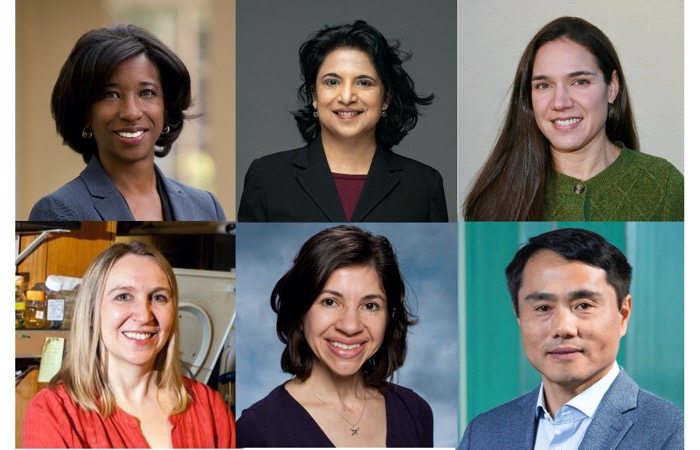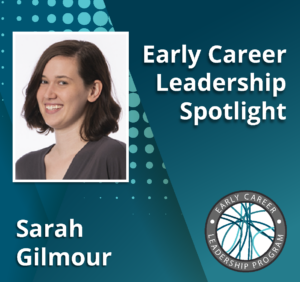The GSA is pleased to welcome six leaders to the Board of Directors, who will be appointed for 2022–2024.
2022 Vice President/2023 President
Tracy Johnson
Cecilia and Keith Terasaki Presidential Endowed Chair, Howard Hughes Medical Institute Professor, Molecular, Cell and Developmental Biology, University of California, Los Angeles, Dean of Life Sciences, University of California, Los Angeles

The goal of Tracy Johnson’s research is to decipher the workings of the elegant ribonucleoprotein machine known as the spliceosome. Her group seeks to understand how regulation of RNA splicing and other RNA processing reactions allows the cell to respond to its environment.
Tracy Johnson earned her BA in Biochemistry and Cell Biology from UC San Diego, her PhD in Biochemistry and Molecular Biology from UC Berkeley, and was a Jane Coffin Childs postdoctoral fellow at the California Institute of Technology (Caltech) where she studied the mechanisms of RNA splicing with John Abelson.
In recent years, Johnson has received the Ruth Kirschstein Diversity in Science Award, was on the Cell Press list of 100 Inspiring Black Scientists in America, and was appointed Keith and Cecilia Terasaki Presidential Endowed Chair in Life Sciences. She served as a permanent member and then chair of the Molecular Genetics NIH study section, and she currently serves on the National Cancer Institute Board of Scientific Counselors. She is a recipient of the Life Sciences Award for Inclusive Excellence for Promoting Diversity, Equity, Inclusion and the UCLA Academic Senate Award for Career Commitment to Diversity, Equity, and Inclusion. She was an Excellence in Mentoring Keynote Speaker for the American Society of Cell Biology and in 2014 she was named an HHMI Professor. In 2013 she was selected as one of the Top 20 Women Professors in California. She currently serves as the Dean of Life Sciences at UCLA.
As GSA President, Johnson hopes to help the Society address some of the most important questions facing the scientific community. How can we leverage an explosion in technology to ask fundamental questions and impact health? How can we transform scientific training, communication, and advocacy? And how can we achieve these goals with an eye toward diversity, equity, and inclusion? Johnson aims to work with the GSA members, leadership, and staff to build on a strong foundation and advance the goals of the genetics community.
Secretary (2022–2024)
Swathi Arur
Associate Professor, Department of Genetics, Division of Basic Science Research, The University of Texas MD Anderson Cancer Center; Course Director, Foundations in Biomedical Sciences, The University of Texas MD Anderson Cancer Center
Secondary appointments: Associate Professor, Department of Genetics, School of Health Professions, The University of Texas MD Anderson Cancer Center; Associate Professor, The University of Texas MD Anderson Cancer Center UTHealth Graduate School of Biomedical Sciences

Swathi Arur’s research is focused on two areas. The first is unraveling the environmentally regulated mechanisms and molecules that control meiotic I progression in female germ cells. The second area is identifying principles and players that regulate tumor progression upon metabolic signaling rather than through the increase in mutational burden.
Arur earned her BS in Microbiology at the University of Delhi, an MS at Panjab University, and a PhD in Microbiology at the All India Institute for Medical Sciences. She conducted postdoctoral research at the University of Connecticut Health Center and Washington University in St Louis.
She is the 2021 recipient of the Linda and Mark Quick Award for Basic Science, an Elected Fellow of the American Association of Advancement in Sciences, and recipient of the 2017 MD Anderson Distinguished Research Faculty Mentor Award, among other honors.
As GSA Secretary, Arur will continue to promote inclusion of all GSA members, advocate for early career scientists, and help drive and execute the vision of our members at large, of building a society that continues to support basic science, bring together scores of model organism researchers through a myriad of meetings to freely exchange ideas, and foster dialogues on effective and ethical use of knowledge rooted in genetic editing.
Directors (2022–2024)
Amanda Larracuente
Associate Professor, Department of Biology, University of Rochester
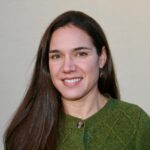
The Larracuente lab’s long-term interests are in discovering mechanisms used by selfish genetic elements to cheat and their impacts on the evolution of genomes and gametogenesis. Their focus is on the large blocks of rapidly evolving repeats that comprise most eukaryotic centromeres, telomeres, and sex chromosomes—satellite DNAs.
Amanda Larracuente earned her BS in Biology at Canisius College and a PhD in Genetics at Cornell University. She was a postdoctoral researcher in the Presgraves lab at the University of Rochester and the Page lab at the Whitehead Institute for Biomedical Research.
Larracuente is an NSF CAREER Award recipient and was a Stephen Biggar and Elisabeth Asaro Fellow in Data Science, Ruth L. Kirschstein National Research Service Award Postdoctoral Fellow, and recipient of a DeLill Nasser Award for Professional Development in Genetics from the GSA.
As a Director, Larracuente will advocate for the support and accessibility of genetic tools and resources, contribute to GSA initiatives that engage students and foster collaboration between educators across our community, and support the expansion of existing GSA efforts to broaden the participation of underrepresented groups in the society and contribute to the professional development of trainees.
Patricia J. Wittkopp
Arthur F. Thurnau Professor and Sally L. Allen Collegiate Professor, Department of Ecology and Evolutionary Biology and Department of Molecular, Cellular, and Developmental Biology, University of Michigan
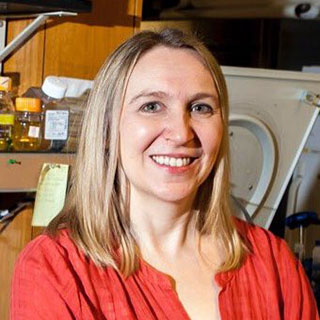
Patricia Wittkopp investigates the genetic basis of phenotypic evolution, particularly the evolution of development and mechanisms controlling gene expression. Molecular and developmental biology, population and quantitative genetics, genomics and bioinformatics are all integrated in this work.
Wittkopp earned a BS in Cellular and Molecular Biology and a BS in Chemistry at the University of Michigan, a PhD in Genetics at the University of Wisconsin, and was a Damon Runyon Cancer Research Foundation Postdoctoral Fellow at Cornell University.
Recently, she has received the Friedrich Wilhelm Bessel Research Award, John Simon Guggenheim Memorial Foundation Fellow, and the Society for Molecular Biology and Evolution Margaret Dayhoff Mid-Career Award. From the University of Michigan, she has received the Elizabeth Caroline Crosby Award, John Dewey Award, Faculty Recognition Award, the Work/Life Champion Award for Supervisors, and the Excellence in Education Award. She has served as the Chair of the Department of Ecology and Evolutionary Biology at the University of Michigan since 2020.
As a Director, Wittkopp will advocate for early career researchers and enhancing diversity and inclusiveness in our field. She will also be an advocate for genetics education, for conferences that maximize interactions and opportunity for researchers at all levels, and for GSA using its platform (alone and in collaboration with other societies) to advocate for societal changes supported by its members.
Martha Soto
Associate Professor, Robert Wood Johnson Medical School, Rutgers
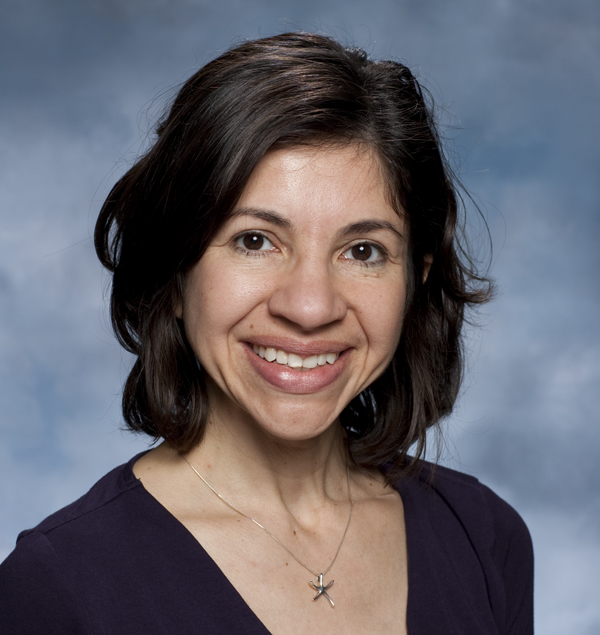
Martha Soto studies the control of cell polarity, which is essential for all cells. Using the nematode C. elegans, these studies combine genetic, molecular, biochemical, and live imaging approaches to investigate how the actin cytoskeleton becomes polarized to promote movements at key points in development.
Soto received a BS in Biology at Massachusetts Institute of Technology, taught science at Cambridge Public Schools, and earned a PhD in the Bender lab at Harvard Medical School. She was a AAAS/ASM Congressional Science Fellow and a postdoctoral fellow in the Mello lab at the University of Massachusetts Medical Center.
Soto’s work has been recognized with the Dean’s Award for Outstanding Service for Outstanding contributions to the Graduate School of Biomedical Sciences, the OASIS Leadership Award from the RWJMS Dean’s Office, Outstanding Postdoc Advocate from the Rutgers-RWJMS Postdoctoral Association, and was the inaugural recipient of the Martha Soto Leadership Award, for efforts on behalf of postdoctoral researchers from the Rutgers Postdoctoral Association.
As a Director, Soto hopes to give back to an organization that has supported her career and share her experiences recruiting and retaining young scientists, including those from communities underrepresented in academia.
Duojia (DJ) Pan
Investigator, Howard Hughes Medical Institute, Bashour Distinguished Professor and Chairman, Department of Physiology, University of Texas Southwestern Medical Center

Duojia (DJ) Pan has a long-standing interest in understanding the molecular mechanisms underlying growth control and tissue homeostasis. His laboratory tackles this question using a combination of Drosophila and mouse genetics, biochemistry, cell and chemical biology approaches. Recent work in the Pan lab has focused on the Hippo pathway, which controls organ size in all animals, and discovering novel growth regulators and interrogating their physiological function in mammals.
Pan earned his BS in Biochemistry at Peking University, his PhD in the Courey lab at UCLA, and was a Jane Coffin Childs Postdoctoral Fellow in the Rubin lab at UC Berkeley. He became an HHMI investigator in 2008 and has served as Chair of the Physiology Department at UT Southwestern Medical Center since 2016. He has been recognized with the Paul Marks Prize for Cancer Research (2013) and the Passano Award (2022).
As a Director, Pan is excited to contribute his scientific and leadership experiences to GSA’s mission in fostering interdisciplinary interactions, empowering young geneticists, building a more inclusive research community, and advocating the importance of genetic research to the greater scientific community and society at large.


